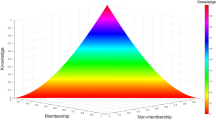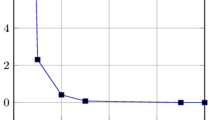Abstract
Knowledge is related to the information considered in a particularly useful context under consideration. A knowledge measure as a dual of fuzzy entropy quantifies the knowledge associated with a fuzzy set. In this paper, a new entropy-based fuzzy knowledge measure is proposed and validated. The performance of the proposed knowledge measure is explained using two numerical examples. Furthermore, a new multi-criteria decision-making method based on the proposed knowledge measure is introduced and illustrated using a numerical example. Besides this, four new measures namely a fuzzy accuracy measure, a knowledge measure using fuzzy accuracy measure, a similarity measure, and a fuzzy information measure are derived from the proposed knowledge measure and validated.
Similar content being viewed by others
Data Availability
Data sharing is not applicable to this article as no datasets were generated or analyzed during the current study.
References
Atanassov KT (1986) Intutionistic fuzzy sets. Fuzzy Sets Syst 20:87–96
Ohlan A (2022) Novel entropy and distance measure for interval-valued intuitionistic fuzzy sets with application in multi-criteria group decision-making. Int J Gen Syst. https://doi.org/10.1080/03081079.2022.2036138
Arya V, Kumar S (2021) Multi-criteria decision making problem for evaluating ERP system using entropy weighting approach and q-rung orthopair fuzzy TODIM. Granul Comput 6:977–989
Arya V, Kumar S (2020) Knowledge measure and entropy: a complementary concept in fuzzy theory. Granul Comput 6(3):631–643
Boekee DE, Vander Lubbe JCA (1980) The \(R\)-norm information measure. Inf Control 45:136–155
Brans JP, Mareschel V (1984) PROMETHEE: a new family of outranking methods in multicriteria analysis. In: Brans JP (ed) Operational research 84. North-Holland, New York, pp 477–490
Benayoun R, Roy B, Sussman B (1966) ELECTRE: Une méthode pour guider le choix en présence de points de vue multiples. Note de travail 49. Direction Scientifique: SEMA-METRA International
Chen T, Li C (2010) Determining objective weights with intutionistic fuzzy entropy measures: a comparative analysis. Inf Sci 180:4207–4222
Chu ATW, Kalaba RE, Spingarn K (1979) A comparison of two methods for determining the weights of belonging to fuzzy sets. J Optim Theor App 27:531–538
Choo EU, Wedley WC (1985) Optimal criterion weights in repetitive multicriteria decision making. J Oper Res Soc 36:983–992
Chen SJ, Chen SM (2001) A new method to measure the similarity between fuzzy numbers. IEEE Int Conf Fuzzy Syst 3:1123–1126
Chen SM, Hsiao W-H, Jong W-T (1997) Bidirectional approximate reasoning based on interval-valued fuzzy sets. Fuzzy Sets Syst 91(3):339–353
Chen SM, Hsiao W-H (2000) Bidirectional approximate reasoning for rule-based systems using interval-valued fuzzy sets. Fuzzy Sets Syst 113(2):185–203
Chen SM (1997) Interval-valued fuzzy hypergraph and fuzzy partition. IEEE Trans Syst Man Cybern Part B (Cybern) 27(4):725–733
Luca AD, Termini S (1972) A definition of non-probabilistic entropy in the setting of fuzzy set theory. Inf Control 20:301–312
Fan J (2002) Some new fuzzy entropy formulas. Fuzzy Sets Syst 2002(128):277–284
Fan ZP (1996) Complicated multiple attribute decision making: theory and applications. Ph.D. Dissertation, Northeastern university, Shenyang, China (1996)
Gomes LFAM, Lima MMPP (1991) Todim: basic and application to multicriteria ranking of projects with environmental impacts. Found Comput Decis Sci 16:113–127
Gupta R, Kumar S (2022) Intuitionistic fuzzy scale-invariant entropy with correlation coefficients-based VIKOR approach for multi-criteria decision-making. Granul Comput 7(1):77–93
Havdra JH, Charvat F (1967) Quantification method classification process: concept of structural \(\alpha\)-entropy. Kybernetika 3:30–35
Hung WL, Yang MS (2006) Fuzzy entropy on intutionistic fuzzy sets. Int J Intell Syst 21:443–451
Hwang CL, Lin MJ (1987) Group decision making under multiple criteria: methods and applications. Springer, Berlin
Hooda DS (2004) On generalized measures of fuzzy entropy. Mathematica slovaca 54:315–325
Hwang CL, Yoon KP (1981) Multiple attribute decision-making: methods and applications. Springer, New York
Hwang CH, Yang MS (2008) On entropy of fuzzy sets. Int J Uncertain Fuzz Knowl Based Syst 16:519–527
Joshi R, Kumar S (2016) \((R, S)\)-norm information measure and a relation between coding and questionnaire theory. Open Syst Inf Dyn 23(3):1–12
Joshi R, Kumar S (2017) A new exponential fuzzy entropy of order-\((\alpha ,\beta )\) and its application in multiple attribute decision making. Commun Math Stat 5(2):213–229
Joshi R, Kumar S (2018) An \((R^{\prime }, S^{\prime })\)-norm fuzzy relative information measure and its applications in strategic decision-making. Comput Appl Math 37:4518–4543
Joshi R, Kumar S (2018) An exponential Jensen fuzzy divergence measure with applications in multiple attribute decision-making. Math Probl Eng. https://doi.org/10.1155/2018/4342098
Joshi R, Kumar S (2018) A new weighted \((\alpha, \beta )\)-norm information measure with applications in coding theory. Phys A Stat Mech Appl 510:538–551
Joshi R, Kumar S (2018) A novel fuzzy decision making method using entropy weights based correlation coefficients under intuitionistic fuzzy environment. Int J Fuzzy Syst. https://doi.org/10.1007/s40815-018-0538-8
Joshi R, Kumar S (2018) An \((R, S)\)-norm fuzzy information measure with its applications in multiple-attribute decision-making. Comput Appl Math 37:2943–2964
Kosko B (1986) Fuzzy entropy and conditioning. Inf Sci 40(2):165–174
Kullback S, Leibler RA (1951) On information and sufficiency. Ann Math Stat 22:79–86
Kerridge DF (1961) Inaccuracy and inference. J Roy Stat Soc Ser B Methodol 23:184–194
Kaufmann A (1975) Introduction to the theory of fuzzy subsets. Academic Press, New York, p 1975
Ratika K, Kumar S (2020) A novel intuitionistic Renyi’s-Tsallis discriminant information measure and its applications in decision-making. Granul Comput 6(4):901–913
Liu M, Ren H (2014) A new intutionistic fuzzy entropy and application in multi-attribute decision-making. Information 5:587–601
Li P, Liu B (2008) Entropy of credibility distributions for fuzzy variables. IEEE Trans Fuzzy Syst 16:123–129
Montes I, Pal NR, Montes S (2018) Entropy measures for Atanassov intuitionistic fuzzy sets based on divergence. Soft Comput 22:5051–5071
Nguyen H (2015) A new knowledge-based measure for Intuitionistic Fuzzy Sets and its application in multiple attribute group decision making. Expert Syst Appl 42(22):8766–8774
Pal NR, Pal SK (1989) Object background segmentation using new definitions of entropy. IEE Proc Eng 366:284–295
Opricovic S (1998) Multi-criteria optimization of civil engineering systems. Ph.D. Thesis, University of Belgrade, Belgrade, Serbia
Opricovic S, Tzeng GH (2004) Decision aiding compromise solution by MCDM methods: a comparative analysis of VIKOR and TOPSIS. Eur J Oper Res 156:445–455
Renyi A (1961) On measures of entropy and information. In: Proceedings of 4th Barkley symposium on mathematics statistics and probability, vol 1, University of California Press, pp 547–561
Saaty TL (1980) The analytical hierarchy process. McGraw-Hill, New York
Shannon CE (1948) A mathematical theory of communication. Bell Syst Tech J 27:379–423
Singh S, Lalotra S, Sharma S (2019) Dual concepts in fuzzy theory: entropy and knowledge measure. https://doi.org/10.1002/int.22085
Smarandache F (2006) Neutrosophic set—a generalization of the intuitionistic fuzzy set. In: IEEE international conference on granular computing. https://doi.org/10.1109/GRC.2006.1635754
Szmidt E, Kacprzyk J, Bujnowski P (2010) On some measures of information and knowledge for intuitionistic fuzzy sets. In: 14-th international conference on IFSs, notes IFS, vol 16, no 2, pp 1–11
Szmidt E, Kacprzyk J, Bujnowski P (2014) How to measure the amount of knowledge conveyed by Atanassov’s intuitionistic fuzzy sets. Inf Sci 257:276–285
Szmidt E, Kacprzyk J (2001) Entropy for intuitionistic fuzzy sets. Fuzzy Sets Syst 118(3):467–477
Tsallis C (1988) Possible generalization of Boltzman-Gibbs statistics. J Stat Phys 52:480–487
Torra V, Narukawa Y (2009) On hesitant fuzzy sets and decision. In: The IEEE conference on fuzzy systems, Jeju Island, Korea, pp 1378–1382
Turksen IB (1986) Interval valued fuzzy sets based on normal forms. Fuzzy Sets Syst 20(2):191–210
Verma R, Sharma BD (2011) A measure of inaccuracy between two fuzzy sets. Cybern Inf Technol 11:13–23
Wei CP, Wang P, Zhang YZ (2011) Entropy, similarity measure for interval-valued intuitionistic fuzzy sets and their application. Inf Sci 181(19):4273–4286
Xia M, Xu Z (2012) Entropy/cross entropy-based group decision making under intuitionistic fuzzy environment. Inf Fus 13:31–47
Ye J (2010) Fuzzy dcision-making method based on the weighted correlation coefficient under intutionistic fuzzy enviornment. Eur J Oper Res 205:202–204
Yu PL (1973) A class of solutions for group decision making problem. Manag Sci 19:936–946
Yager RR (1979) On the measure of fuzziness and negation part I: membership in the unit interval. Int J Gen Syst 5(4):221–229
Yager R (2020) Decision-making with measure modeled uncertain payoffs and multiple goals. Granul Comput 5(2):149–154
Zadeh LA (1965) Fuzzy sets. Inf Comput 8(3):338–353
Zadeh LA (1968) Probability measures of fuzzy events. J Math Anal Appl 23:421–427
Zavadskas EK, Kaklauskas A, Sarka V (1994) The new method of multicriteria complex proportional assessment of projects. Technol Econ Dev Econ 1(3):131–139
Author information
Authors and Affiliations
Corresponding author
Ethics declarations
Conflict of interests
On behalf of all authors, the corresponding author states that there is no conflict of interest.
Additional information
Publisher's Note
Springer Nature remains neutral with regard to jurisdictional claims in published maps and institutional affiliations.
Rights and permissions
About this article
Cite this article
Joshi, R. Multi-criteria decision making based on novel fuzzy knowledge measures. Granul. Comput. 8, 253–270 (2023). https://doi.org/10.1007/s41066-022-00329-y
Received:
Accepted:
Published:
Issue Date:
DOI: https://doi.org/10.1007/s41066-022-00329-y




